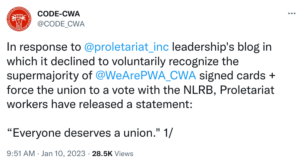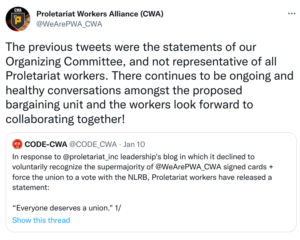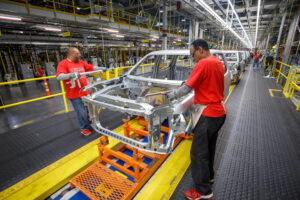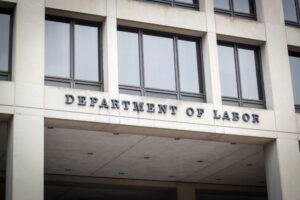It’s not Halloween without some terrifying tricks from union bosses around the country. Check out the latest labor rackets below.
In Georgia, Savannah Division, Connie Deal, former bookkeeper for International Brotherhood of Electrical Workers (IBEW) Local 508 (located in Savannah, Ga.), was sentenced to 12 months of probation. Deal was also ordered to pay $22,982 in restitution. On May 11, 2022, Deal pleaded guilty to one count of making false entries.
In Massachusetts, Frank Loconte, former NER Construction Management President, was indicted with four counts of mail fraud, one count of theft from an employee benefit plan, and four counts of false ERISA statements, in violation of 18 U.S.C. 1341, 664, and 1027, respectively, which resulted in a total loss of $1,094,504 to the Massachusetts and Northern New England Laborers’ District Council of the Laborers International Union of North America and the Bricklayers and Allied Craftsmen Local 3. Additionally, Loconte was charged with four counts of failure to collect or pay over taxes totaling $3,096,931.
In Texas, Jeannette Simmons, former bookkeeper for Sheet Metal, Air, Rail and Transportation Workers (SMART) Southwest Gulf Coast Regional Council (located in San Antonio, Tex.), pleaded guilty to one count of misapplication of fiduciary property in the amount greater than $30,000 and less than $150,000.
In Louisiana, Wilbert Barnes, former Recording Secretary of United Steelworkers (USW) Local 1362 (located in Bogalusa, La.), was charged in an information with making a false entry in a union record.
In the District of Columbia, Melba Norris, an associate of a former employee of the Service Employees International Union (SEIU) (located in Washington, D.C.), was sentenced to six months in prison followed by 24 months of probation. Norris was also ordered to pay $37,007 in restitution. On May 5, 2022, Norris pleaded guilty to one count of embezzlement and one count of conspiracy to embezzle union funds.
In New York (SDNY), John DeFalco, former Vice President of Carpenters Local 157 (located in New York, N.Y.), was sentenced to three years of supervised release. He was also ordered to pay $148,213 in restitution as well as $149,735 in forfeiture. On June 25, 2019, DeFalco and Salvatore Tagliaferro, former President of Carpenters Local 926 (located in Brooklyn, N.Y.) and a New York City District Council of Carpenters Representative, were indicted as co-conspirators on multiple charges for a scheme to sell union “books” or membership cards (union property) in exchange for cash bribes. On October 27, 2020, DeFalco pleaded guilty to conspiracy, conversion of union assets, honest services wire fraud, witness tampering, obstruction of justice, false statements, and distribution of oxycodone, in violation of 18 U.S.C. 371; 29 U.S.C. 501(c) and 18 U.S.C. 2; 18 U.S.C. 1343, 1346 and 2; 18 U.S.C. 1512 (b)(1) and 2; 18 U.S.C. 1512(b)(2)(A) and 2; 18 U.S.C. 1001; and 21 U.S.C. 812, 841(a)(1) and (b)(1)(C). In 2021, following a jury trial, Tagliaferro was found guilty of conspiracy, conversion of union assets, and honest services wire fraud, sentenced to five years in prison, and was ordered to pay $145,065 in restitution and $296,400 in forfeiture.
In Virginia, Roanoke Division, Albert Jennings, former Financial Secretary-Treasurer of Transportation Communications Union (TCU) Lodge 6061 (located in Roanoke, Va.), pleaded guilty to one count of embezzling $39,331 from the union.
In the District of Columbia, James Bradley, an associate of a former employee of the American Federation of Government Employees (AFGE) National Union (located in Washington, D.C.), was charged in a criminal information with one count of conspiracy to embezzle $205,421 from the union.
In Texas, Anthony Landin, former Secretary-Treasurer of Communications Workers of America (CWA) Local 6110 (located in Laredo, Tex.), was indicted for embezzlement of union funds in the amount of $18,328.
In Louisiana, Dusty Diffey, former Financial Secretary of United Steelworkers Local 253M (located in Simsboro, La.), was charged in a bill of information with embezzling $33,678 in union funds.
In Louisiana, David Mason, former President of United Steelworkers Local 253M (located in Simsboro, La.), was charged in a bill of information with embezzling $24,398 in union funds.
In Louisiana, Daniel Hinton, former Vice President of United Steelworkers Local 253M (located in Simsboro, La.), was charged in a bill of information with embezzling $4,051 in union funds.
In New York, Jay A. Garnsey, former Financial Secretary of United Mine Workers of America (UMWA) Local 717 (located in Ilion, N.Y.), was charged in a one-count information with embezzlement from a labor organization for embezzling $38,173.















